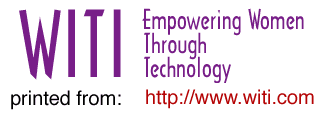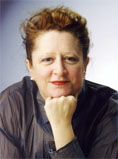
 Margaret Heffernan
Margaret Heffernan
Vice President, Information Services and CIO
Quantum Corporation
As president and COO, Margaret Heffernan oversees iCAST's production, programming
and business development operations. Her career in multi-media includes
film, television, radio, multi-media software and the Internet.
Heffernan conceived of and produced CMGI's first multi-media Internet
site, ZineZone, where she served as its president and CEO.
Heffernan began her career in Britain, where she worked with its leading
writers and performers to produce films, documentaries and comedy
programs for the BBC. Her most notorious program was a two man epic
history of the French Revolution for the bicentennial. She then ran the
Independent Program Producers Association and was a consultant to the
independent film and TV production communities, including Bob Geldof's
Planet 24 Production Company. In search of greater opportunity,
Heffernan moved to the United States in the early '90s and began
consulting for multi-media software companies.
She was a new product advisor to (among others) Twelve Tone Systems and Pilgrim New
Media. She also served as vice president of acquisitions
for Vertigo Development Group, where she spearheaded multi-media product
partnerships with companies like Intuit, The Learning Company and
Standard & Poor's.
Convinced the Web would evolve quickly from a print format into an
entertainment medium, Heffernan decided she would use her production
expertise to create an interactive, multi-media rich Web site. She
joined forces with CMGI and soon delivered ZineZone, its first
multi-media site. As president and CEO, Margaret grew a loyal audience
with daily updated, customized content, state-of-the-art multi-media,
self-publishing areas, live email chats and more. After a year of
mastering the nuances of mult-media production on the Internet, ZineZone
has been integrated into iCAST and now serves as the heart of its
multi-media production operations.
Heffernan received a B.A. and an M.A. from Cambridge University,
England. She is married with two children.
1. What was your first job in technology?
2. Who has been your most significant mentor? Why?
3. What has been your greatest challenge and what strategies did you use to overcome obstacles?
How did I overcome obstacles? I worked closely and passionately
with
some truly gifted, world-class engineers. I drove them and myself. I
loudly
rewarded success. I set the pace by working most of the hours of the day
and
night.
4. Who has been the most influential person in your life? Why?
5. What lessons have you learned that would be valuable to women beginning their careers in technology?
6. What new technology do you believe will have the most positive impact on the world in the next 20 years? The most negative impact?
On a lighter note:
2. What was the last book you read? What books do you love to recommend?
The book I most often recommend, and that I read about once every 5
years, is "War and Peace."
3. If you were to choose a different profession, what would it be?
Realistically, if I have a next career, I think it could be back in
the theater since I believe that the growth of digital entertainment -
which
will be huge - will put a premium on, and increase demand for, live
entertainment.
4. What is your definition of success?
My first job was consulting for software companies that wanted to
become multimedia companies. I spent the bulk of my efforts trying to
get
the media folks to understand the software folks and vice versa. It was
my
conclusion, at the time, that software companies could not become media
companies -- so I rendered myself unemployable!
In the technology space, my greatest mentor has been David
Wetherell, the CEO of CMGi from whom I have learned a lot and who has
had a
great deal of faith in me. I had a number of (male) mentors in radio and
TV
who did likewise.
I was hired by CMGi in 1996 to build a company around a piece of
technology it had acquired. The understanding at that time was that the
software was just about ready to ship, the salesforce was poised to
close
deals with 5 major customers. It turned out that the software, far from
being ready to ship, just did not work -- so the salesforce and the
customers went away. I was left with the challenge of re-engineering a
tremendously complex piece of software. All I brought to the challenge
was
ruthless determination.
Impossible to answer. My mother, who was an energetic entrepreneur;
my dad who is a fearless negotiator. My philosophy professor at
Cambridge
taught me scepticism. My first boss at the BBC - Piers Plowright -
always
took risks. My first husband who was never afraid. My friends who have
kept
me going. David Wetherell who learns faster than anyone on the planet.
My
first CTO who taught me everything I know about technology. My family
who
are forgiving but don't accept excuses. W.H.Auden and his fascination
for
how things work. Dickens and his insight into how things don't work.
Beethoven and I.M. Pei who both understood that simple is the hardest
thing
to do.
All great things have a down side. The printing press permits
pornography and hate propaganda. The radio makes dumb talk and bad music
ubiquitous. Cars have wrecked our environment. Planes destroy community.
It
happens. There is no such thing as the unambivalently good technology. I
don't think it's a fruitful way of looking at the remorseless
development of
ideas.
1. If you could have dinner with any 2 people (living or not), who would they be?
Oliver Cromwell and Issey Miyake - but not together!
I think the last book I read was the World War I trilogy by Pat
Barker ("Regeneration," "The Eye in the Door" and "The Ghost Road").
Even though I've no talent, I've always wanted to be an architect.
In your work, you are successful if you are in a position to have
ideas and execute them with a gifted team of trusted collaborators.
In your life, you are successful if you are surrounded by people you
trust and who enjoy your company, warts and all.
|
For more 'WITI Women' articles, go to: http://www.witi.com/wire/witiwomen/ For all the latest news and information on women in technology, visit http://www.witi.com |